New assays return copper grades up to 13.80% over 15.50 metres
in the central discovery area
Six rigs now drilling at Kamoa North to extend the discovery’s
strike length and fast track a resource estimate
Drilling on Ivanhoe’s 100%-owned Western Foreland licences,
immediately north of the Kamoa-Kakula mining licence,
has discovered the extension of the Kamoa Far North high-grade
shallow copper corridor on Ivanhoe’s wholly-owned licences
for at least 400 metres
KOLWEZI, DEMOCRATIC REPUBLIC OF CONGO – Robert Friedland and Yufeng “Miles” Sun, Co-Chairmen of Ivanhoe Mines (TSX: IVN; OTCQX: IVPAF), announced today that the strike length of the shallow, thick, massive copper sulphide mineralization at the Kamoa North Bonanza Zone that was discovered earlier this year in drill hole DD1450 (13.05% copper over 22.3 metres (true thickness), at a 2% copper cut-off grade) on the Kamoa-Kakula mining licence in the Democratic Republic of Congo (DRC) has been extended by at least another 200 metres along strike to 550 metres, with a width of up to 60 metres across strike (see Figure 2).
Five rigs are extending and infilling the central and eastern portions of the implied 2.7-kilometre Kamoa North Bonanza mineralized corridor, and a sixth rig is drilling high-grade mineralization around holes DD0015 and DD1200 located to the west of the major north-south trending West Scarp Fault, which down drops the high-grade discovery zone by approximately 250 metres.
The central and eastern portions of the Kamoa North Bonanza Zone have drilled thicknesses of between six and 36 metres, and are approximately 170 to 220 metres below surface, with grades ranging as high as 18.48% copper over 13.6 metres, at both a 2% and a 3% cut-off grade.
The Kamoa North Bonanza Zone represents a new style of copper mineralization at Kamoa-Kakula, where massive to semi-massive chalcopyrite, bornite and chalcocite have locally replaced pyrite in the Kamoa Pyritic Siltstone (KPS) – a pyritic siltstone that lies immediately above the basal diamictite unit that typically hosts the copper mineralization at Kamoa-Kakula.
Assay results for 19 new holes have been received from the Kamoa North Bonanza Zone (see tables 1 and 2 on pages 13 and 14 for a complete list of assays).
Significant new drilling intercepts from the Kamoa North Bonanza Zone include:
- DD1508 intersected11.82 metres of 10.41% copper, at a 3% copper cut-off, and 12.82 metres of 9.76% copper, at a 1% and 2% copper cut-off, in semi-massive sulphide KPS-hosted mineralization, beginning at a downhole depth of 185.0 metres.
- DD1520 intersected13.49 metres of 13.69% copper, at a 3% copper cut-off, and 28.38 metres of 7.74% copper, at a 2% copper cut-off, in semi-massive sulphide KPS-hosted mineralization, beginning at a downhole depth of 193.5 metres; and 36.00 metres of 6.45% copper at a 1% cut-off.
- DD1522 intersected16.24 metres of 13.41% copper, at a 3% copper cut-off, and 25.74 metres of 9.34% copper, at a 2% copper cut-off, in semi-massive sulphide KPS-hosted mineralization, beginning at a downhole depth of 198.7 metres; and 28.89 metres of 8.49% copper at a 1% cut-off.
- DD1527 intersected15.50 metres of 13.80% copper, at a 3% copper cut-off, and 26.00 metres of 9.46% copper, at a 2% copper cut-off, in semi-massive sulphide KPS-hosted mineralization, beginning at a downhole depth of 205.0 metres; and 26.00 metres of 9.46% copper at a 1% cut-off.
- DD1531 intersected4.37 metres of 12.37% copper, at a 3% copper cut-off, and 5.06 metres of 11.09% copper, at a 2% copper cut-off, in semi-massive sulphide KPS-hosted mineralization, beginning at a downhole depth of 205.0 metres; and 12.87 metres of 5.35% copper at a 1% cut-off.
Infill drilling in the shallow central core of the Kamoa North Bonanza Zone is focused on delineating an initial mineral resource estimate.
“Drilling in the core of the Kamoa North Bonanza Zone continues to return extremely high-grade copper assays over very thick intersections of up to 30 metres, or 100 feet,” said Mr. Friedland. “Given the shallow depth of the Kamoa North mineralization and the remarkable copper grades and thicknesses encountered to date, Kamoa-Kakula’s engineering team already is working on conceptual development plans to access the ultra-high-grade mineralization.”
Additional assays received from 11 holes drilled along the 10-kilometre Kamoa Far North high-grade copper corridor, with grades ranging
up to 9.37% copper over 6.46 metres
Assay results also have been received for the final 11 drill holes completed in the Kamoa Far North Area. The results confirm earlier visual and portable Niton (X-ray fluorescence or XRF) estimates that the high-grade mineralized trend that had been defined over a distance of 10 kilometres in the Kamoa North region has been traced to the northern boundary of the Kamoa-Kakula mining licence. More than 29,000 metres have been drilled so far this year on the Kamoa-Kakula mining licence, and an additional 26,000 metres currently are planned.
Highlights of recent Kamoa Far North drilling include:
- DD1482 intersected 6.46 metres (true thickness) of 9.37% copper, at a 3% copper cut-off, and 8.31 metres (true thickness) of 7.84% copper, at a 1% and 2% copper cut-off beginning at a downhole depth of 250.0 metres.
- DD1492 intersected 10.36 metres (true thickness) of 6.99% copper, at a 3% and 2% copper cut-off, and 11.16 metres (true thickness) of 6.59% copper, at a 1% copper cut-off, beginning at a downhole depth of 226.9 metres.
- DD1502 intersected 9.56 metres (true thickness) of 5.59% copper, at a 3%, 2% and 1% copper cut-off, beginning at a downhole depth of 262.0 metres.
- DD1517 intersected 3.10 metres (true thickness) of 6.62% copper, at a 3%, 2% and 1% copper cut-off, beginning at a downhole depth of 325.38 metres.
Drilling has discovered at least 400 metres of shallow, copper-rich mineralization on Ivanhoe’s 100%-owned Western Foreland licence, along strike of the 10-kilometre Kamoa Far North high-grade copper corridor
Drilling on Ivanhoe’s 100%-owned Western Foreland licences, immediately north of the northern border of the Kamoa-Kakula mining licence, has confirmed the extension of the Kamoa Far North high-grade trend onto Ivanhoe’s licences for at least 400 metres.
Two east-west section lines located at 200 metres and 400 metres north of the Kamoa-Kakula mining licence have been drill tested at 100-metre intervals. Visually strong copper mineralization has been intersected in a single hole on both section lines. The copper mineralization intersected is consistent in downhole depth and stratigraphic location with the copper mineralization intercepted in the Kamoa Far North high-grade trend.
Six holes have been completed in this new discovery area and assays are pending. Ivanhoe also is continuing exploration drilling, ground geophysics and airborne geophysics on other DRC exploration targets.
Discovery of KPS-hosted mineralization at Kamoa North opens the door to multiple exploration opportunities at Kamoa-Kakula and the adjoining Western Foreland ground
The ultra-high copper grades intercepted to date in the Kamoa North Bonanza Zone are believed to be the result of the controlling east-west growth fault structure having allowed oxidized, copper-rich brines to bypass the lower redox interface at the Roan-Nguba contact that is the typical mineralized horizon at Kamoa-Kakula. Instead, the copper-rich brines accessed the overlying, highly-sulphidic and reduced KPS, resulting in a new, upper mineralized zone hosted in the KPS and characterized by the bonanza-grade copper found in the vicinity of hole DD1450.
The growth fault structure is characterized by a wide zone of sub-parallel, low-angle, fault planes dipping at approximately 40 degrees to the south through the KPS (see Figure 4). Replacement of pyrite in the vicinity of these fault planes, as a result of a combination of cross-stratal and stratabound fluid flow, has resulted in mineralization that transects the KPS from top in the north to bottom in the south.
Pyrite is an excellent reductant, and consequently in many places the pyrite has been completely replaced by chalcopyrite, bornite and chalcocite (see figures 5 and 6). The copper content of chalcopyrite is approximately 35%, while the copper content of bornite is approximately 63% and is nearly 80% for chalcocite.
The Kamoa North Bonanza Zone remains open along a westerly-easterly strike for a considerable distance. An east-west lineament, thought to represent the controlling growth structure, can be traced in aeromagnetic data for up to 20 kilometres, across the western side of the Kamoa-Kakula mining licence and onto Ivanhoe’s adjoining, 100%-owned Western Foreland exploration licences (see Figure 2).
Figure 1: Kamoa-Kakula mining licence, showing the Kamoa North Bonanza and Kamoa Far North zones, the new Kamoa Far North extension discovery on Ivanhoe’s 100%-owned exploration licences, and the planned mines at Kakula and Kansoko.
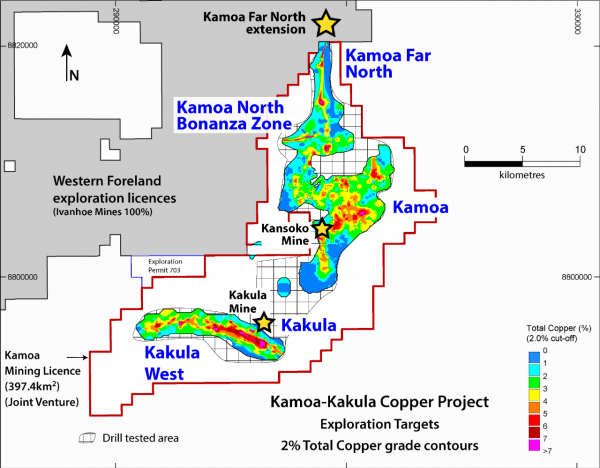
Figure 2: Location plan map of the Kamoa North Bonanza Zone.
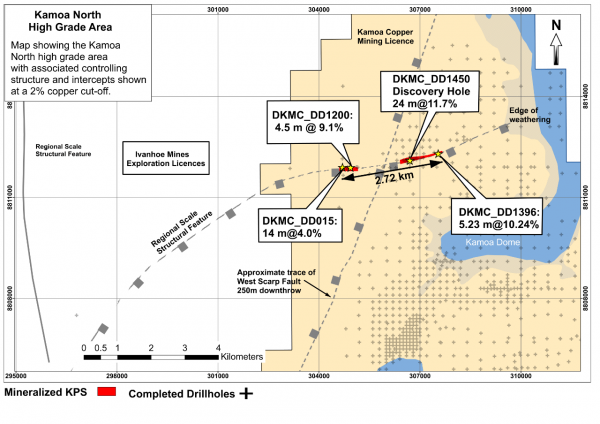
Figure 3: Plan view of Kamoa North Bonanza Zone drill-hole collars and interpreted high-grade corridor (drill intercepts shown at a 2% copper cut-off).
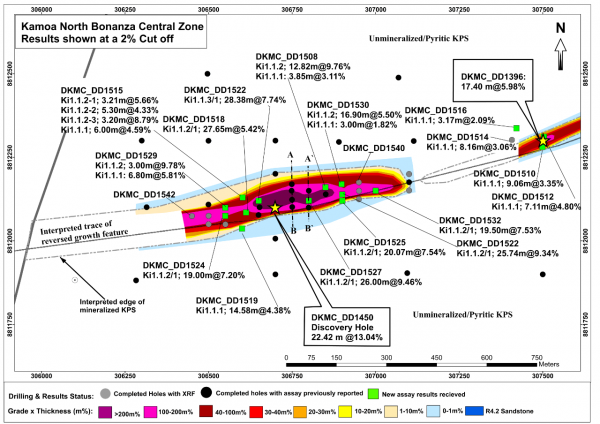
Drill intersections for the Kamoa North Bonanza Zone holes in this release are reported as drilled thicknesses pending more detailed drilling and analysis; however, preliminary interpretation of drill sections indicates that the majority of drill holes transected the zone at approximately perpendicular angles (see Figure 4 below for an illustration).
Figure 4 shows the diamictite layer (in white) that is the typical mineralized horizon at Kamoa and Kakula, as well as the overlying KPS siltstone layer (in yellow) that hosts the Kamoa North Bonanza Zone mineralization.
Figure 4: Section views through the Kamoa North Bonanza Zone.
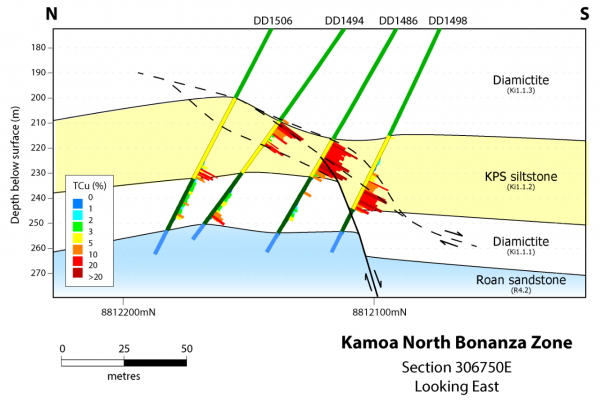
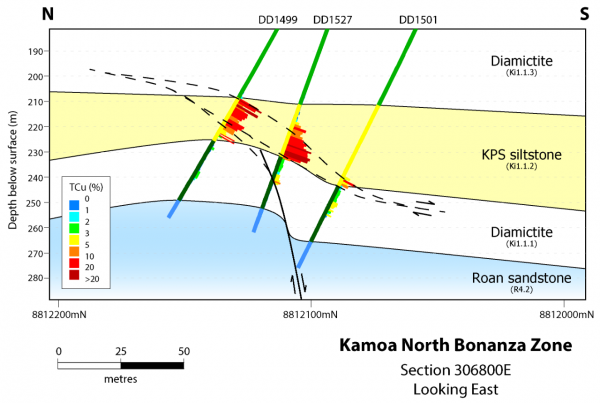
Figure 5: Copper grade profiles of recent holes across the Kamoa North Bonanza Zone, showing dominant copper sulphide, copper assay values and composite grades at 1%, 2% and 3% copper cut-offs.
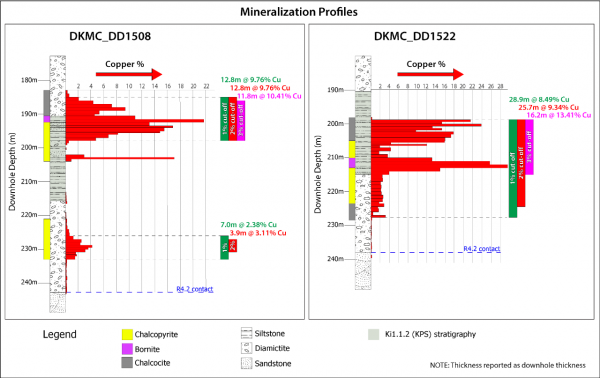
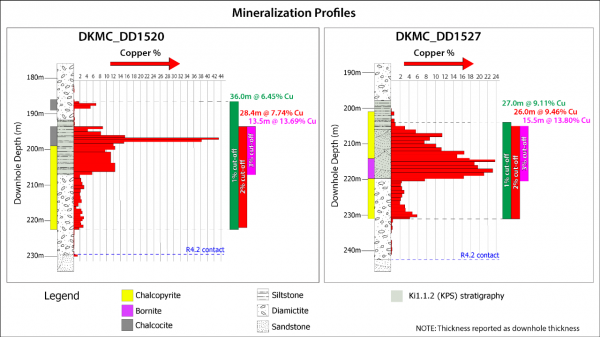
Figure 6: Examples of mineralization from the Kamoa North Bonanza Zone.
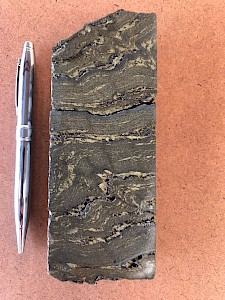 |
DD1532 sample from a downhole depth of 208 metres, containing finely disseminated chalcopyrite (CuFeS2). The grade of the sample is 18.3% copper. |
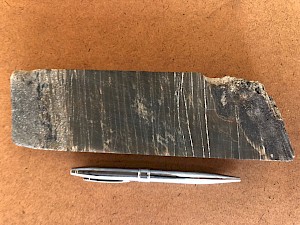 |
DD1522 sample from a downhole depth of 212.1 metres, containing finely disseminated bornite (Cu5FeS4). The grade of the sample is 29.3% copper. |
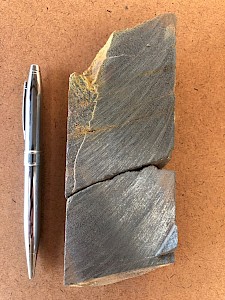 |
DD1542 drilled on the west of the Bonanza Central Zone is pending assays. This sample is from a downhole depth of 219 metres and is semi-massive chalcocite. Chalcocite (Cu2S), the dominant copper mineral at the Kakula Discovery, is nearly 80% copper by weight. |
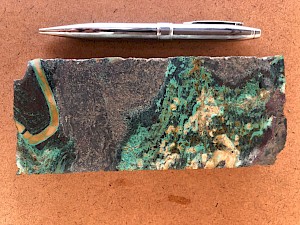 |
DD1520 sample from a downhole depth of 197 metres, containing predominantly massive chalcocite, bornite and some copper oxide (CuO). The grade of the sample is 46% copper. |
Figure 7: Location of recent drilling results in the Kamoa Far North Exploration Area, and the Kamoa Far North extension on Ivanhoe’s 100%-owned Western Foreland exploration licences.
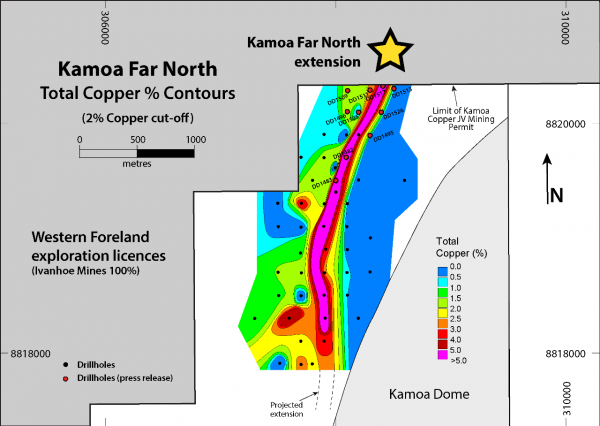
Kamoa-Kakula progressing toward first copper production from the Kakula Mine
Ivanhoe is pleased to report that excellent progress is being made in the construction of the Kakula Mine – the stage one, six-million-tonne-per-annum (6 Mtpa) operation – on the Kamoa-Kakula Copper Project. The first underground access drives are very close to intersecting Kakula’s initial high-grade ore, and Ivanhoe and its joint-venture partner Zijin Mining are advancing rapidly on earthworks for the processing plant and other surface infrastructure. The joint venture also has issued purchase orders or tenders for the long-lead mining and processing equipment. Initial copper concentrate production from the Kakula Mine currently is scheduled for the third quarter of 2021.
The Kamoa-Kakula Copper Project is approximately 25 kilometres west of the miningcentre of Kolwezi in the DRC. It is a joint venture between Ivanhoe Mines (39.6%), Zijin Mining Group (39.6%), Crystal River Global Limited (0.8%) and the DRC government (20%). Ivanhoe Mines and Zijin Mining are co-funding development of the Kamoa-Kakula Copper Project.
Based on existing mineral resources, Kamoa-Kakula has been independently ranked as the world’s fourth-largest copper deposit and Kamoa-Kakula’s copper grades are the highest, by a wide margin, of the world’s top 10 copper deposits.
Kamoa-Kakula is unique as it combines ultra-high copper grades in thick, shallow and relatively flat-lying deposits ─ allowing for large-scale, highly-productive, mechanized underground mining operations. Kakula, the first of multiple planned mines expected to be placed into production at Kamoa-Kakula, is projected to have an average grade of 6.8% copper over the initial five years of operations, and 6.4% copper over the first 10 years ─ grades that are orders of magnitude higher than the majority of the world’s other major copper mines.
Table 1: Summary of composites for all Kamoa North holes with assays received.
Drill intersections for the Kamoa North Bonanza Zone are reported as drilled thicknesses pending more detailed analysis. Preliminary interpretation of drill sections (see Figure 4) indicates that the majority of drill holes transected the zone at approximately perpendicular angles to the interpreted dip of the mineralized zone.

Table 2: Summary of composites for all Kamoa North holes with assays received.

Table 3: Collars of drill holes discussed in this release.

Qualified Person and Quality Control and Assurance
Scientific and technical information in this news release has been reviewed and approved by Stephen Torr, P.Geo., Ivanhoe Mines’ Vice President, Project Geology and Evaluation, a Qualified Person under the terms of National Instrument 43-101. Mr. Torr is not independent of Ivanhoe Mines. Mr. Torr has verified the technical data disclosed in this news release.
Ivanhoe Mines maintains a comprehensive chain of custody and quality assurance and quality control (QA/QC) program on assays from its Kamoa-Kakula Copper Project. Half-sawn core is processed at the Kamoa-Kakula on-site preparation laboratory and prepared samples then are shipped by secure courier to Bureau Veritas Minerals (BVM) Laboratories in Australia, an ISO17025-accredited facility. Copper assays are determined at BVM by mixed-acid digestion with ICP finish. Industry-standard certified reference materials and blanks are inserted into the sample stream prior to dispatch to BVM. For detailed information about assay methods and data verification measures used to support the scientific and technical information, please refer to the March 2019 technical report titled “Kamoa-Kakula 2019 Integrated Development Plan”, on the Ivanhoe Mines SEDAR profile at www.sedar.com and available at www.ivanhoemines.com.
About Ivanhoe Mines
Ivanhoe Mines is a Canadian mining company focused on advancing its three principal projects in Southern Africa: the development of new mines at the Kamoa-Kakula copper discovery in the Democratic Republic of Congo (DRC) and the Platreef palladium-platinum-nickel-copper-gold discovery in South Africa; and the extensive redevelopment and upgrading of the historic Kipushi zinc-copper-germanium-silver mine, also in the DRC. The company also is exploring for new copper discoveries on its wholly-owned Western Foreland exploration licences, adjacent to the Kamoa-Kakula mining licence.
Information contacts
Investors: Bill Trenaman +1.604.331.9834
Media: Kimberly Lim +1.778.996.8510
Cautionary statement on forward-looking information
Certain statements in this release constitute “forward-looking statements” or “forward-looking information” within the meaning of applicable securities laws, including without limitation, (i) statements regarding that Kamoa North Bonanza Zone has an implied strike length of at least 2.7 kilometres; (ii) statements that an additional 26,000 metres currently are planned on Kamoa-Kakula mining licence this year; and (iii) statements that initial copper concentrate production from the Kakula Mine currently is scheduled for the third quarter of 2021.
Such statements involve known and unknown risks, uncertainties and other factors which may cause the actual results, performance or achievements of the company, or industry results, to be materially different from any future results, performance or achievements expressed or implied by such forward-looking statements or information. Such statements can be identified by the use of words such as “may”, “would”, “could”, “will”, “intend”, “expect”, “believe”, “plan”, “anticipate”, “estimate”, “scheduled”, “forecast”, “predict” and other similar terminology, or state that certain actions, events or results “may”, “could”, “would”, “might” or “will” be taken, occur or be achieved. These statements reflect the company’s current expectations regarding future events, performance and results and speak only as of the date of this release.
All such forward-looking information and statements are based on certain assumptions and analyses made by Ivanhoe Mines’ management in light of their experience and perception of historical trends, current conditions and expected future developments, as well as other factors management believe are appropriate in the circumstances. These statements, however, are subject to a variety of risks and uncertainties and other factors that could cause actual events or results to differ materially from those projected in the forward-looking information or statements including, but not limited to, unexpected changes in laws, rules or regulations (including retroactive application), the failure of contractual agreements with the State to be honoured in whole or in part, or in the enforcement or application of laws, rules and regulations by applicable authorities; the failure of parties to contracts to perform as agreed; social or labour unrest; changes in commodity prices, including the price of copper; unexpected failure or inadequacy of infrastructure, or delays in the development of infrastructure, the failure of exploration programs or other studies to deliver anticipated results or results that would justify and support continued studies, development or operations, and the results of economic studies and evaluations. Other important factors that could cause actual results to differ from these forward-looking statements also include those described under the heading “Risk Factors” in the company’s most recently filed MD&A as well as in the most recent Annual Information Form filed by Ivanhoe Mines. Readers are cautioned not to place undue reliance on forward-looking information or statements. The factors and assumptions used to develop the forward-looking information and statements, and the risks that could cause the actual results to differ materially are set forth in the “Risk Factors” section and elsewhere in the company’s most recent Management’s Discussion and Analysis report and Annual Information Form, available at www.sedar.com.
This news release also may contain references to estimates of Mineral Resources. The estimation of Mineral Resources is inherently uncertain and involves subjective judgments about many relevant factors. Mineral Resources that are not Mineral Reserves do not have demonstrated economic viability. The accuracy of any such estimates is a function of the quantity and quality of available data, and of the assumptions made and judgments used in engineering and geological interpretation, which may prove to be unreliable and depend, to a certain extent, upon the analysis of drilling results and statistical inferences that may ultimately prove to be inaccurate.
Mineral Resource estimates may have to be re-estimated based on, among other things: (i) fluctuations in copper prices or other mineral prices; (ii) results of drilling; (iii) results of metallurgical testing and other studies; (iv) changes to proposed mining operations, including dilution; (v) the evaluation of mine plans subsequent to the date of any estimates; (vi) the possible failure to receive required permits, approvals and licences, or changes to any such permits, approvals or licences; and (v) changes in laws, rules or regulations, including changes to tax, VAT, and royalty rates whether to be applied prospectively or retroactively.
Although the forward-looking statements contained in this news release are based upon what management of the company believes are reasonable assumptions, the company cannot assure investors that actual results will be consistent with these forward-looking statements. These forward-looking statements are made as of the date of this news release and are expressly qualified in their entirety by this cautionary statement. Subject to applicable securities laws, the company does not assume any obligation to update or revise the forward-looking statements contained herein to reflect events or circumstances occurring after the date of this news release.


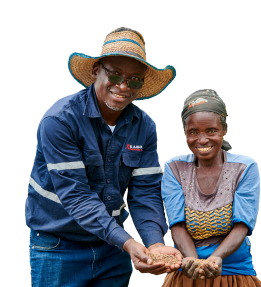
 English
English Français
Français 日本語
日本語 中文
中文